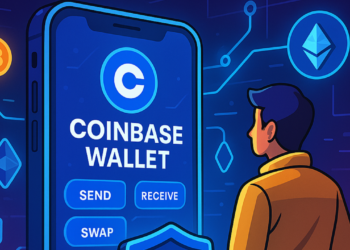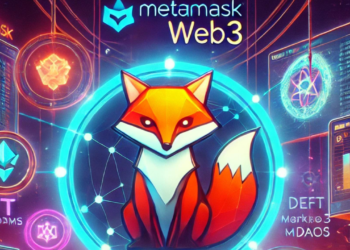MetaMask is one of the most popular Ethereum wallets and browser extensions in the crypto world. It allows users to interact with decentralized applications (dApps), manage crypto assets, and securely store private keys. But while MetaMask offers convenience and powerful features, it also comes with a set of risks that every user should be aware of.
In this in-depth guide, we’ll explore the most common risks associated with using MetaMask and share practical steps to safeguard your funds and personal information. Whether you’re a beginner or an experienced user, this guide will help you use MetaMask with greater confidence and security.
What Is MetaMask?
MetaMask is a non-custodial crypto wallet that functions as a browser extension and mobile app. It enables users to:
- Store and manage Ethereum (ETH) and ERC-20 tokens
- Interact with dApps and DeFi protocols
- Swap tokens directly within the wallet
- Connect to multiple blockchain networks like Binance Smart Chain, Polygon, and Arbitrum
Official Website: https://metamask.io
Since MetaMask is non-custodial, it means that you are responsible for safeguarding your private keys and recovery phrase. This offers greater freedom, but also comes with serious responsibility.
Common Risks of Using MetaMask
1. Phishing Attacks
Phishing is one of the most common threats MetaMask users face. These attacks often appear in the form of:
- Fake websites mimicking MetaMask or crypto exchanges
- Malicious browser pop-ups
- Discord or Telegram messages with suspicious links
Once you enter your seed phrase on a fake site, the attacker can instantly drain your wallet.
How to Protect Yourself:
- Always check the website URL before entering any sensitive information.
- Bookmark the official MetaMask site.
- Never share your seed phrase or private key with anyone.
- Use browser extensions like MetaMask’s phishing detector.
2. Malware and Keyloggers
Malware can infect your device and capture keystrokes, screenshots, or clipboard data. If you copy and paste your seed phrase or private key, it could be stolen by hidden spyware.
How to Protect Yourself:
- Keep your operating system and antivirus software updated.
- Avoid downloading pirated software or unknown files.
- Consider using a hardware wallet like the Trezor Model One or Trezor Model T for added security.
3. Social Engineering Scams
Attackers often impersonate MetaMask support or crypto influencers and try to trick users into giving away sensitive information.
How to Protect Yourself:
- MetaMask does not offer direct customer support through private DMs.
- Be cautious of unsolicited messages on social media.
- Join the official MetaMask support channels.
4. Man-in-the-Middle (MITM) Attacks
If you’re using an unsecured public Wi-Fi connection, attackers can intercept your data and potentially hijack your wallet session.
How to Protect Yourself:
- Never access MetaMask on public Wi-Fi without a VPN.
- Use HTTPS-only connections.
- Regularly disconnect your wallet from dApps when not in use.
5. Fake MetaMask Extensions
There are countless fake MetaMask apps and browser extensions designed to steal your crypto.
How to Protect Yourself:
- Only install MetaMask from the official website or verified app stores.
- Read user reviews before downloading any crypto-related app.
6. Poor Seed Phrase Storage
If you write down your seed phrase on paper and lose it, or store it on a device that gets hacked, you risk losing access to your wallet forever.
How to Protect Yourself:
- Store your seed phrase offline in a secure location.
- Use fireproof and waterproof seed storage devices.
- For maximum security, use a hardware wallet like Trezor Model One or Trezor Model T.
7. Malicious Smart Contracts
When connecting your MetaMask wallet to dApps, you may unknowingly approve a malicious smart contract that drains your funds.
How to Protect Yourself:
- Use trusted platforms with good reputations.
- Regularly review and revoke token approvals using tools like Etherscan’s token approval checker.
- Avoid connecting your wallet to unknown or experimental dApps.
8. Wallet Drainers and Airdrop Scams
Some airdrops or NFTs are designed to look legitimate but contain hidden smart contract functions that can steal your assets if you interact with them.
How to Protect Yourself:
- Don’t interact with random tokens or NFTs that appear in your wallet.
- Be wary of “free airdrop” claims that require wallet connection or approvals.
- Use a secondary wallet for testing unknown dApps.
Pro Tips to Secure Your MetaMask Wallet
Use a Hardware Wallet
Integrating a hardware wallet like Trezor with MetaMask adds a significant layer of security. Your private keys remain offline, reducing exposure to online attacks.
Create Multiple Wallets
Create separate wallets for:
- Long-term holdings
- Daily transactions
- Experimental DeFi interactions
This limits your risk exposure.
Regularly Revoke Permissions
Use tools like Revoke.cash or Etherscan to revoke smart contract permissions you no longer use.
Backup Your Seed Phrase Properly
- Don’t store it digitally or in cloud storage.
- Use metal backup solutions if possible.
- Keep multiple copies in separate, secure locations.
Use a Reputable Exchange
For buying and selling tokens, choose a reliable exchange like MEXC that supports a wide variety of tokens and strong security practices.
Final Thoughts
MetaMask is a powerful tool for navigating the decentralized web, but with great power comes great responsibility. Understanding the risks and proactively taking steps to protect yourself can help ensure a safer and more enjoyable crypto experience.
By following the practices outlined in this guide—like using a hardware wallet, staying alert to phishing, and managing smart contract permissions—you’ll be better equipped to guard your assets and personal data.
Stay safe, stay smart, and stay decentralized.
Disclaimer
This content is for educational purposes only and does not constitute financial, investment, or security advice. Always do your own research (DYOR) and consider consulting with a professional before making any financial decisions. Affiliate links may provide the author with a small commission at no extra cost to you.










